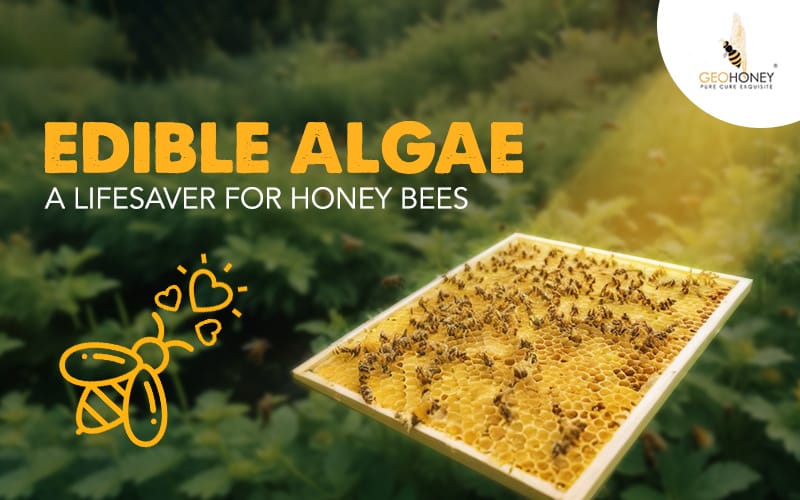- Tokyo: 09:13
- Singapore: 08:13
- Dubai: 04:13
- London: 00:13
- New York: 19:13
Edible Algae: A Lifesaver for Honey Bees

Edible Algae: A Lifesaver for Honey Bees
Source :Phys.org
Honey bees play an essential role in pollination, contributing significantly to global agriculture and biodiversity. However, these vital insects face numerous threats, including habitat loss, pesticides, and diseases. Among the latter, viral infections pose a significant challenge to bee health and colony survival. Recently, scientists have discovered a promising solution: an edible blue-green algae that not only provides nutritional benefits but also boosts the bees' immune systems. This breakthrough has the potential to offer a sustainable and scalable method to protect honey bee populations.
The Importance of Honey Bees
Honey bees are indispensable pollinators for many crops, including fruits, vegetables, and nuts. According to the Food and Agriculture Organization (FAO), about 75% of the world's food crops rely to some extent on pollination. Without bees, the availability and diversity of fresh produce would diminish, leading to nutritional deficiencies and economic losses. The health of bee populations is thus directly linked to food security and ecosystem stability.
Threats to Honey Bees
In recent years, honey bees have been facing numerous challenges, often collectively referred to as Colony Collapse Disorder (CCD). CCD involves the sudden disappearance of worker bees from a hive, leaving behind the queen and immature bees. While the exact causes of CCD are multifactorial, several key threats have been identified:
Pesticides: Exposure to neonicotinoids and other pesticides can weaken bees' immune systems and impair their ability to forage and navigate.
Parasites: Varroa mites are notorious for infesting bee colonies, feeding on bee larvae, and spreading viruses.
Viruses: Bees are susceptible to a range of viral infections, including the deformed wing virus (DWV) and Israeli acute paralysis virus (IAPV), which can be devastating to colonies.
The Role of Algae in Bee Health
In a groundbreaking study, researchers explored the potential of Spirulina, a type of blue-green algae, as a dietary supplement for honey bees. Spirulina is known for its high nutritional content, including proteins, vitamins, minerals, and antioxidants. These properties make it an excellent supplement not only for humans but also for bees.
The researchers found that Spirulina has several benefits for honey bees:
Nutritional Support: Spirulina provides essential nutrients that can enhance bees' overall health and longevity. The high protein content is particularly beneficial during periods of low pollen availability.
Immune Boosting: One of the most significant findings was Spirulina's ability to enhance the bees' immune response. The algae contains compounds that can activate and strengthen the immune system, helping bees fight off infections.
Antiviral Properties: Spirulina has been shown to possess antiviral properties, which can help reduce the viral load in bee colonies. By mitigating the impact of viruses, Spirulina can enhance colony survival rates.
Mechanisms of Action
The exact mechanisms through which Spirulina exerts its beneficial effects on honey bees are still being investigated. However, several hypotheses have been proposed:
Antioxidants: Spirulina is rich in antioxidants, such as phycocyanin and beta-carotene, which can neutralize free radicals and reduce oxidative stress in bees. This helps in protecting cellular components from damage and enhances immune function.
Immune Modulation: Spirulina contains polysaccharides and other bioactive compounds that can modulate the immune response. These compounds may enhance the production of antimicrobial peptides, which are crucial for defending against pathogens.
Nutrient Synergy: The combination of vitamins, minerals, and other nutrients in Spirulina may work synergistically to boost bees' overall health and resilience.
Practical Applications
Integrating Spirulina into bee diets could be a game-changer for beekeepers and conservationists. Here are some potential applications:
Supplementing Feed: Beekeepers can add Spirulina powder to sugar syrup or pollen patties to provide a balanced diet for their colonies, especially during periods of low natural forage.
Enhancing Immunity: Regular supplementation with Spirulina could help strengthen bees' immune systems, making them more resilient to diseases and environmental stressors.
Sustainable Solution: Spirulina cultivation is relatively simple and sustainable, requiring minimal resources compared to other agricultural practices. This makes it an economically viable option for beekeepers worldwide.
Conclusion
The discovery of Spirulina's benefits for honey bees represents a significant advancement in apicultural science. By providing essential nutrients and enhancing immune function, Spirulina can help mitigate some of the major threats facing honey bees today. As research continues, this edible algae could become a staple in beekeeping practices, supporting the health and sustainability of bee populations globally. Ensuring the well-being of honey bees is not just about protecting these fascinating insects but also about safeguarding our food supply and the natural ecosystems they help sustain.



